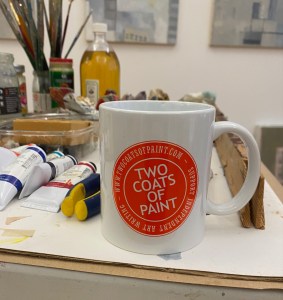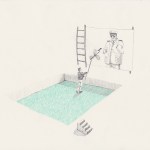
Contributed by Jonathan Stevenson / Once Upon a Time � in Hollywood, Quentin Tarantino�s re-imagining of the Sharon Tate story, is among his best films. It is on a par with Pulp Fiction and Inglourious Basterds, emotionally moving as well as intellectually hefty, and everything a black comedy should be: smart and ultimately serious as well as funny. The scene is 1969 Los Angeles, and aging former TV western star Rick Dalton (Leonardo DiCaprio, never better, and winking at himself) is trying to move forward with movies, abetted by his weathered but game stunt double, gofer, and drinking buddy Cliff Booth (an unerring Brad Pitt, ditto). Cliff lives in a double-wide between a drive-in theater and the freeway with his pit bull Brandy but spends most of his time alongside Dalton, whose house is next door to Roman Polanski and Sharon Tate�s in Benedict Canyon. They don�t interact with the Polanskis. Roman is often in Europe, and Sharon is a rising starlet, featured in Dean Martin�s Matt Helm vehicle The Wrecking Crew. What ultimately connects them is not the private drive they share so much as the culture of Hollywood.
For Tarantino, of course, that culture � and especially the movie business � is integral to real life and to posterity. But in this film, he is acutely aware that, whatever movies themselves dramatize, they cannot change reality but can merely illuminate it. Thus, he provides a touchingly na�ve, genial, hopeful and loved Sharon Tate (Margot Robbie, terrific) that only makes it more painful and poignant to remember what really happened to her. On the socio-cultural level, the film vividly juxtaposes the Europe-inflected California counterculture and the LA establishment, and reminds contemporary viewers that even in that epoch they were mutually dependent and not all that different; in the forms of Polanski/Tate/Sebring and Dalton/Booth, they literally live next door to each other. But the counterculture would usher in the New Hollywood. The �hippies� are the outliers, and the graphically violent hippie bashing in Once Upon a Time � in Hollywood is shocking. In Tarantino�s amped-up way, though, it reflects what was then the reality: the counterculture mavens liked hippies only in theory, and domesticated social and political radicalism into �radical chic� precisely because they were uncomfortable with the raw original and didn�t want to rock the boat too much. And since those taking the lumps are hated Manson Family aberrations of hippiedom, Tarantino is betting that catharsis will trump opprobrium.
In its visual sumptuousness, the picture is a cinematic feast. The period details � the clothes, the cars, the music, the drugs, the signage, the lingo, the outlook � nail late-1960s Los Angeles. Knowing simulations of various TV shows and westerns (spaghetti and not) are fond and spot-on. Tarantino�s irony homework is as meticulous and snarky as ever. The film sports a sardonically elegiac title that nods to Sergio Leone�s earnestly elegiac movie names (and to the movies themselves, also irony-free). In the soundtrack Tarantino includes Paul Revere and the Raiders� teenybopper hit �Good Thing,� which was co-written by Terry Melcher � the record producer who dissed Manson, leading him to seek Melcher out, find Polanski and Tate living in his old house, and vent his anger on them. The dialogue is often hilarious and always purposeful. Cracks like �Don�t let the Mexicans see you cry� � Cliff�s admonition to a drunk and depressed Rick as he betrays his distress over being a has-been in front of parking valets � encapsulate an abundance of telling attitude with efficient wit.
Narrative tension isn�t an overarching Tarantino priority, and here his discursive storytelling � much of it in cars, by way of his signature sharp and elegant film technique � portrays an entire culture within a movie. During roughly the first two-thirds of the film, he asks the audience to pause and languish in 1969 LA, where an inordinate portion of anyone�s time is spent wasting time driving, and ponder how the memory of its glamour, intrigue, and violence � especially through noirish books and movies � resonates today. At strategically key points, though, there is plenty of tension and forward momentum, particularly in the agonizingly long Spahn Ranch sequence and the gonzo, psychedelic climax at Rick Dalton�s pad. The film closes with pace and resolution.
Tarantino remains, unabashedly, a wise-ass nostalgist, and the movie�s arch fondness for �men�s men� and the satisfaction that mayhem brings is discomfiting. It�s hardly alone. Curtis Hanson�s L.A. Confidential (1997), for instance, also exalts the city�s violent postwar epoch. In starkest terms, Once Upon a Time … in Hollywood is a requiem for the unapologetically swashbuckling white guy idealized in the Golden Age of Hollywood, and beyond that a wistful daydream about how nice it would have been if vintage-1950s American males could have saved Sharon Tate (and everything she represented) in 1969. But the historical context makes it clear that they didn�t, and that�s just as much a part of the movie. Tarantino recognizes a future generation of women, in the character of a precocious eight-year old actress Trudi Fraser (or rather, �actor,� played by the truly precocious Julia Butters, now 12), who are better educated, better prepared, and more sophisticated than early-boomer men. To be sure, he indulges a number of snide digs at feminism. None other than feminist self-parody Lena Dunham leads an angry mob of Manson women confronting Cliff at Spahn Ranch. Tarantino�s Sharon Tate is an accommodating sweetheart, hippie chicks scary emasculators. And Rick, in improvising a scene, throws the too-clever eight-year old girl to the floor. These barbs reflect some mild resentment, but on balance they are lighthearted, so transparent as to be affectionate. The little girl assures a contrite Rick of her resilience: she�s wearing elbow pads.
Still, Tarantino will be scolded for celebrating a chauvinistic time � Sharon revels in her Rat Pack-esque movie � when there was no real scolding for such things. But opening big may prove the best revenge: the film grossed more on its debut than any of his other movies. Its success will moderate Tarantino�s implicit fear that his mistreatment of Uma Thurman while filming Kill Bill, association with Harvey Weinstein, and history of thematic misogyny have marginalized him. And the movie does offer circumstantial evidence that a real Tarantino man protects the helpless from predators and acknowledges the power of women. By dint of sheer talent, and a little evolution, he could well have his many-layered cake and eat it, too.
Irrespective of zeitgeist movie politics, this picture thoroughly captures the overriding sense of this country in 1969: we were supposed to bask in its moral superiority and its material bounty, but its main commodity was horror in one form or another. The native proximity of violence to opulence hovered over the American Dream and threatened its validity. Men were gravely ambivalent from a moral point of view: for all Cliff Booth�s winningly submerged decency and confidence, he is rumored to have killed his wife and gotten away with it (as William Burroughs did); however softhearted Rick Dalton is, he�s also a fulminating reactionary (as many ostensibly with-it Hollywood people were then). The country undeniably has moved backwards, in that direction. Whether Tarantino intended to include his lamentations with that message � his detractors will say no, that he is a stealthy Trumpian � is open to debate. Whatever he is actually thinking, Once Upon a Time … in Hollywood is a beautifully crafted and impeccably acted film, and a supremely relevant and thought-provoking one.
Once Upon a Time … in Hollywood, directed by Quentin Tarantino, distributed by Sony Pictures Releasing.
Related posts:
Art and Film: The lives of artists
Art and Film: Van Gogh�s sanity
Art and Film: John Callahan�s Higher Power















Indeed, Quentin is a wise- ass nostalgist( adorable term) , which may be the only, true, genderless( ideally) ,valid , catch- all term for art – making in these times. Wonderful review, btw?